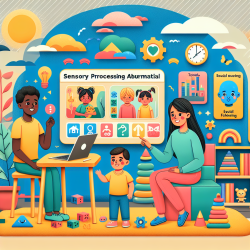Introduction to Environmental Epigenetics
Environmental epigenetics is a burgeoning field that examines how environmental factors can influence gene expression without altering the DNA sequence. The implications of these findings are profound, particularly in the realm of child development and therapeutic interventions. As practitioners in the field of speech language pathology, understanding and integrating these insights can significantly enhance the outcomes of the children we serve.
Key Findings from the 2023 Update
The recent publication, Environmental Epigenetics 2023 update, provides critical insights into how environmental factors such as nutrition, stress, and exposure to toxins can lead to epigenetic changes that affect child development. These changes can have lasting effects on cognitive functions, language acquisition, and social behaviors.
Some of the key findings include:
- The impact of prenatal exposure to pollutants on language development delays.
- The role of maternal nutrition in shaping neurodevelopmental outcomes.
- The potential for early interventions to mitigate negative epigenetic effects.
Implications for Practitioners
For practitioners providing online therapy services, such as those at TinyEYE, these findings underscore the importance of considering environmental factors when developing treatment plans. Here are some actionable steps practitioners can take:
- Comprehensive Assessments: Incorporate questions about environmental exposures and maternal health history in assessments to better understand the child's developmental context.
- Holistic Treatment Plans: Design therapy plans that not only focus on speech and language skills but also consider nutritional and environmental factors that could be influencing the child's development.
- Parental Guidance: Educate parents on the potential impacts of environmental factors and provide strategies to minimize negative exposures.
- Collaboration with Other Professionals: Work closely with nutritionists, pediatricians, and environmental health experts to create a multidisciplinary approach to child development.
Encouraging Further Research
While the current research provides a solid foundation, there is a need for further studies to explore the nuances of environmental epigenetics in child development. Practitioners are encouraged to stay informed about new research findings and consider participating in studies that aim to expand our understanding of these complex interactions.
Conclusion
Integrating insights from environmental epigenetics into speech language pathology can lead to more effective and personalized therapy outcomes for children. By understanding the environmental factors that contribute to developmental changes, practitioners can better support the children and families they serve.
To read the original research paper, please follow this link: Environmental Epigenetics 2023 update.










